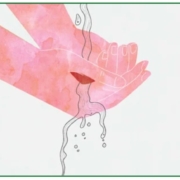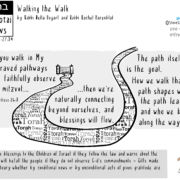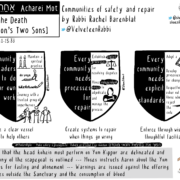Graceful Love / Graceful Masculinity: Kedoshim
 Part of a periodic Torah series on graceful masculinity and Jewish values.
Part of a periodic Torah series on graceful masculinity and Jewish values.
לֹא-תִקֹּם וְלֹא-תִטֹּר אֶת-בְּנֵי עַמֶּךָ, וְאָהַבְתָּ לְרֵעֲךָ כָּמוֹךָ: אֲנִי, יְהוָה.
You shall not take revenge nor shall you bear a grudge against the members of your people; you shall love your fellow as you love yourself – I am Hashem. (Lev. 19:18)
Reb Aron of Karlin taught that if one wants to know how one is doing as a lover of G-d, one should do an accounting of one’s love for G-d’s children. Then one will know one’s true level of love for G-d. The only other place in the Torah where the word “ואהבת“ – and you shall love – is found is with the commandment to love G-d. It has been observed that “Love Hashem, your G-d” (Deuteronomy 6:5) has the same numerical value in Hebrew as “Love your neighbor like yourself, I am Hashem.”
It is perhaps for this reason that we are given this mitzvah here in Kedoshim. The Imrie Noam notes that the word “Kedoshim” is plural and alludes to these two opportunities to generate holiness through love. Two times קדש (holy) also equals “ ואהבת לרעך כמו” / Love your neighbor like yourself. Rashi explains (19:1) that this Parsha was said at a gathering of the entire assembly of Israel, because the majority of the essentials of the Torah depend upon it [to be holy].
This principle of loving another as a way of connecting to “I am Hashem” is articulated by the Ari Z”l (Shar HaKavanas) as follows: “A person must accept upon themselves the commandment to love another as themselves before they pray, for whatever one does for G-d, they must also do for all of G-d’s children.” The Book of Leviticus opens with this teaching as well: “When a person (singular) among you offers…you shall bring your offering (plural).”
In the Midrash’s exploration for why everyone needed to gather to hear this Parsha, Rabbi Levi answers, “because the Ten Commandments are incorporated into it.” The Midrash cites a corresponding verse for each of the ten commandments, and the one that is quoted as representing the commandment of “Don’t covet” is “Loving your neighbor.” Nachmanides explains that when we increase our love for one another and we are happy when good things happen to others, we lose the ability to be jealous or vengeful.
When G-d asks us to be holy, at the beginning of the Parsha, the point of departure is our similarity; “because I am holy.” Loving one another as one loves oneself asks one to overcome the perception that we are too different, distinct, or dissimilar to ever see our identities as bound up with each other as one. However, often when we see someone as too similar to us, we can feel threatened, insecure, and in competition for our unique offerings.
The Arvei Nachal quotes a dispute between Plato and Aristotle on the source of love — coming either from the ways in which we are comparable to, or the opposite of, each other. He argues that Platonic love, like the wealthy person pursuing the poor to offer charity (Shabbos 104a), isn’t true love. Rather it’s a self focused love acquired through kindness to another. This works in both directions, as the Medresh teaches “More than the person who is wealthy does for the person who is poor, the poor person does for the wealthy.”
When two people need each other, like a buyer and a seller, each supports the other and benefits from the relationship. In a dynamic where there isn’t a perceived differential of power, the Torah encourages us to put in the effort to love another, particularly, when they are “like ourselves.”
The Aristotelian model, which is less commonly achieved, asks us not to seek out what’s in it for us, but to cleave to and elevate the lovablity of the other. This is primarily accomplished when we are first able to see ourselves as lovable, and then because we see each other as equals, we can engage in truly loving each other.
We find this distinction when Jacob asks Joseph not to bury him in Egypt “ וַיִּקְרָ֣א ׀ לִבְנ֣וֹ לְיוֹסֵ֗ף וַיֹּ֤אמֶר לוֹ֙ אִם־נָ֨א מָצָ֤אתִי חֵן֙ בְּעֵינֶ֔יךָ …וְעָשִׂ֤יתָ עִמָּדִי֙ חֶ֣סֶד וֶאֱמֶ֔ת – He called to his son, Joseph, if I have found grace in your eyes…please do for me this kindness and truth.” Rashi explains that the “kindness that people do for the dead is the kindness of truth, because one doesn’t look forward to reciprocation.” The Malbim comments that the inclusion of both “son” and “Joseph” alludes to Jacob making his request on two different fronts. As a son, Joseph had certain obligations and needs to honor his father’s wishes. But as a person, he made a different kind of ask, predicated on the recognition of grace.
Rebbe Akiva said about loving another as ourselves “This is a great principle of the Torah.” The Sadigura Rebbe understood “ourselves” as meaning the way that we, ourselves, treat each other. G-d then reciprocates, and treats us in that same way. Our actions towards each other define our levels of holiness and indicate our true love for G-d.

By R. Mike Moskowitz.









